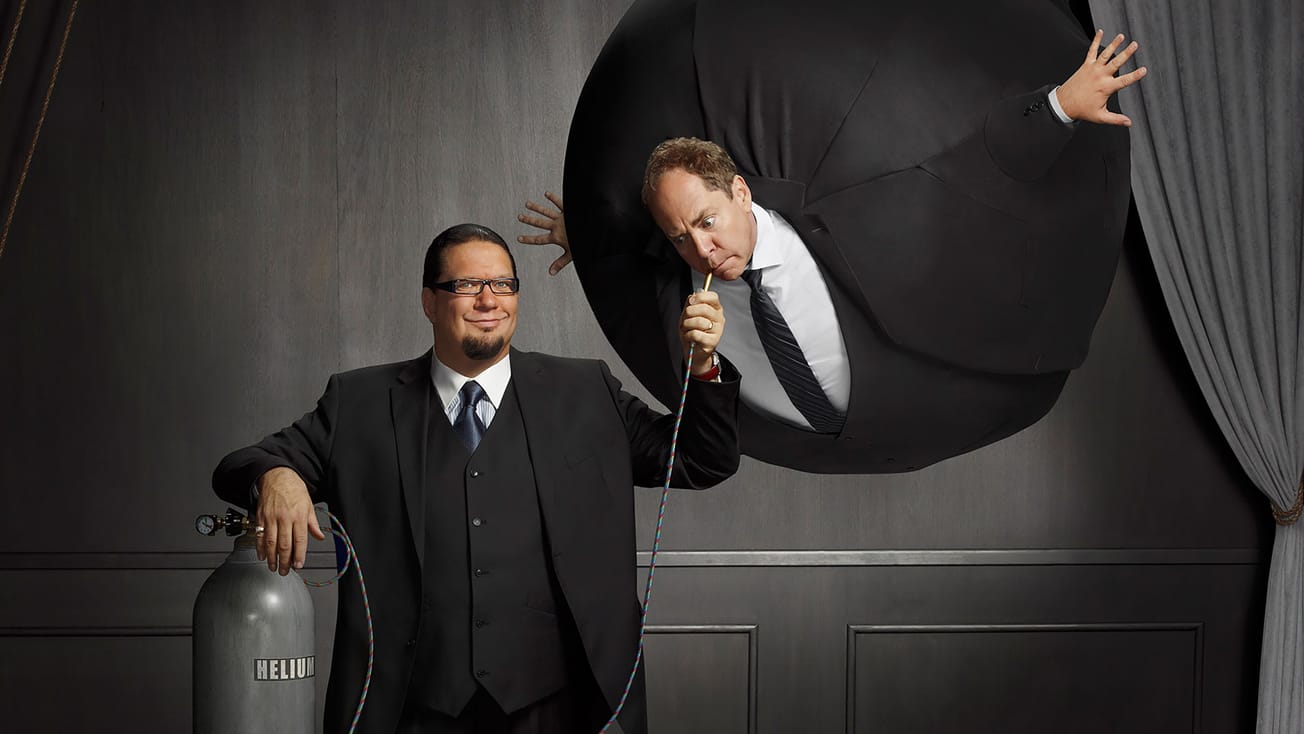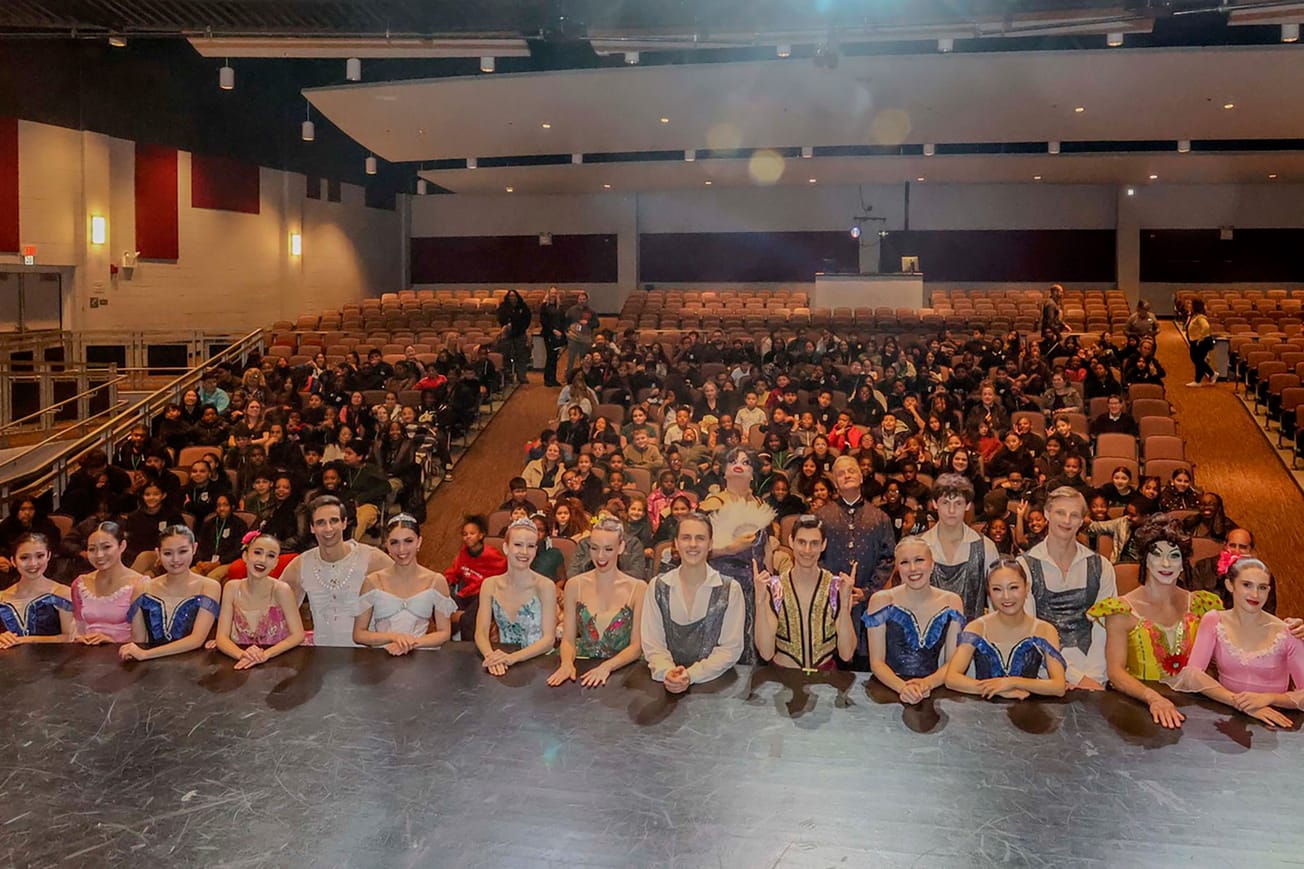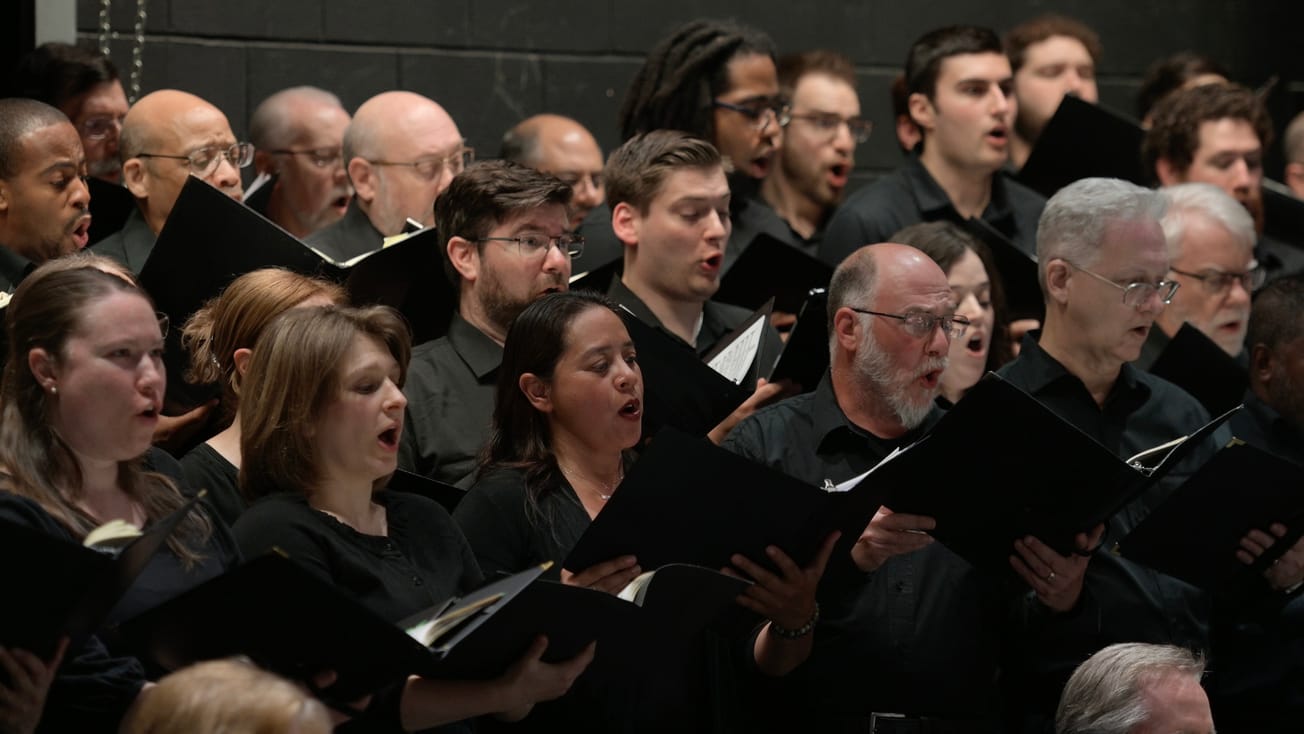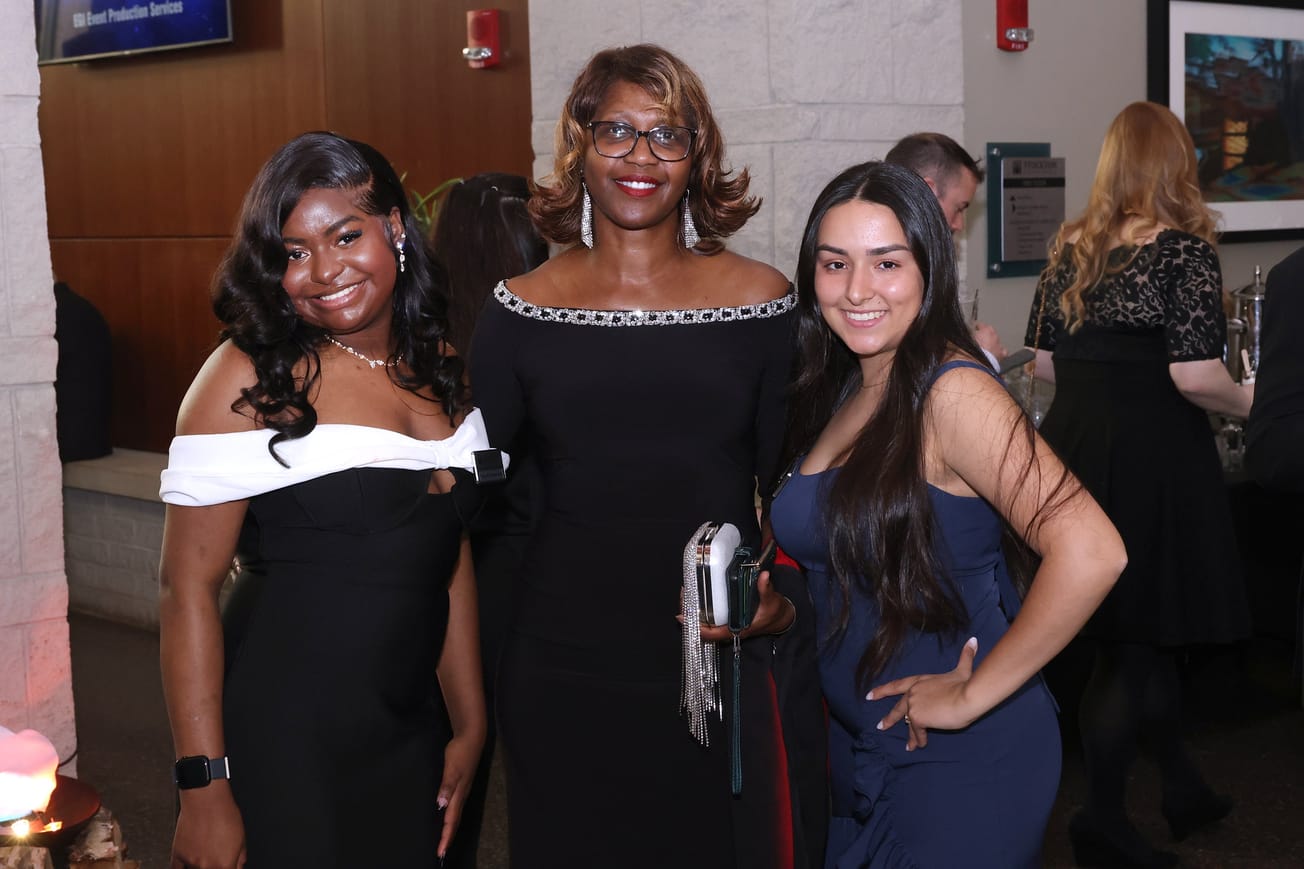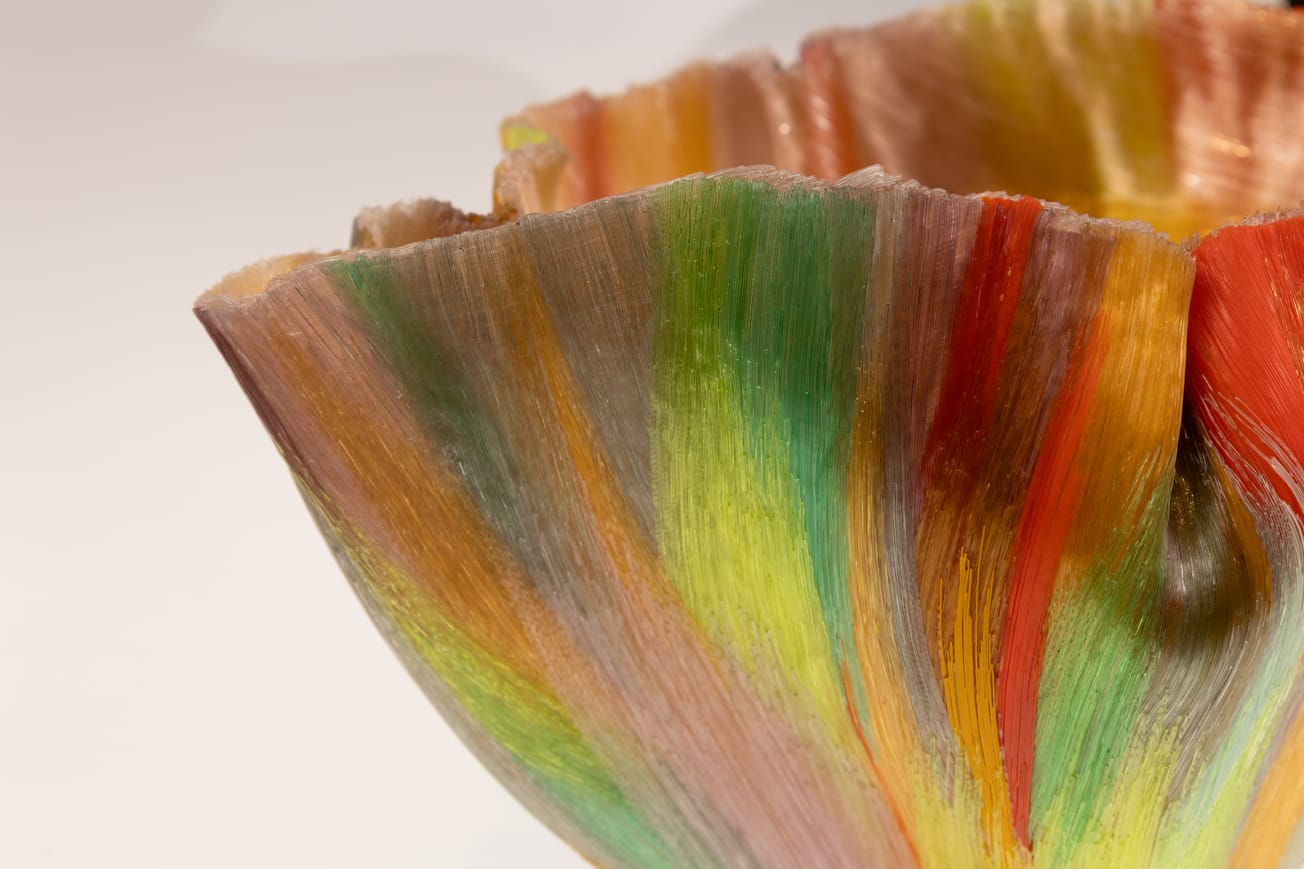By David J. Spatz
Imagine working for a company that pays you a lot of money, lets you do whatever you want, never questions or second-guesses your work and doesn’t even miss you if you disappear for a few days.
Some would call it the perfect job.
Penn & Teller call it the ultimate expression of artistic freedom.
For the past 15 years, the magic and comedy team of Penn Jillette and his stage partner Teller – just Teller, no first name for the Philadelphia native – have had a residency gig in the 1,475-seat theater that bears their names at the Rio All-Suite Hotel and Casino in Las Vegas.
“We have bosses that don’t care about us. At all. Don’t even know we exist,” says Jillette, who has the stage banter and patter of an old-time Boardwalk huckster, which plays brilliantly off the perfectly-silent Teller, who nary utters a word on stage yet speaks volumes with his eyes and his facial expressions.
“They have slot machines to worry about, they have buffets to worry about,” he adds. “And as long as X number of people are in (the Penn & Teller Theater) every month, they just check that off on the bottom line.”
And that, Jillette says, is a type of freedom other artists only wish they had.
“There are (people) that make much more money than us, and are much more famous than us, but they don’t have that freedom,” he says very candidly. “I mean, Beyoncé certainly doesn’t. Jay-Z certainly doesn’t. Jimmy Fallon certainly doesn’t. But we really get to do artistically just what we really like, and we get paid for it, and we get to live at home.”
Show business is filled with magicians. It also has a plethora of comedians. Some have even managed to find a way to combine both forms of entertainment. But no act – at least none in the 40 years since Penn & Teller teamed up – has found a way to combine inventive, how-do-they-do-that magic and very clever comedy into an art form uniquely their own.
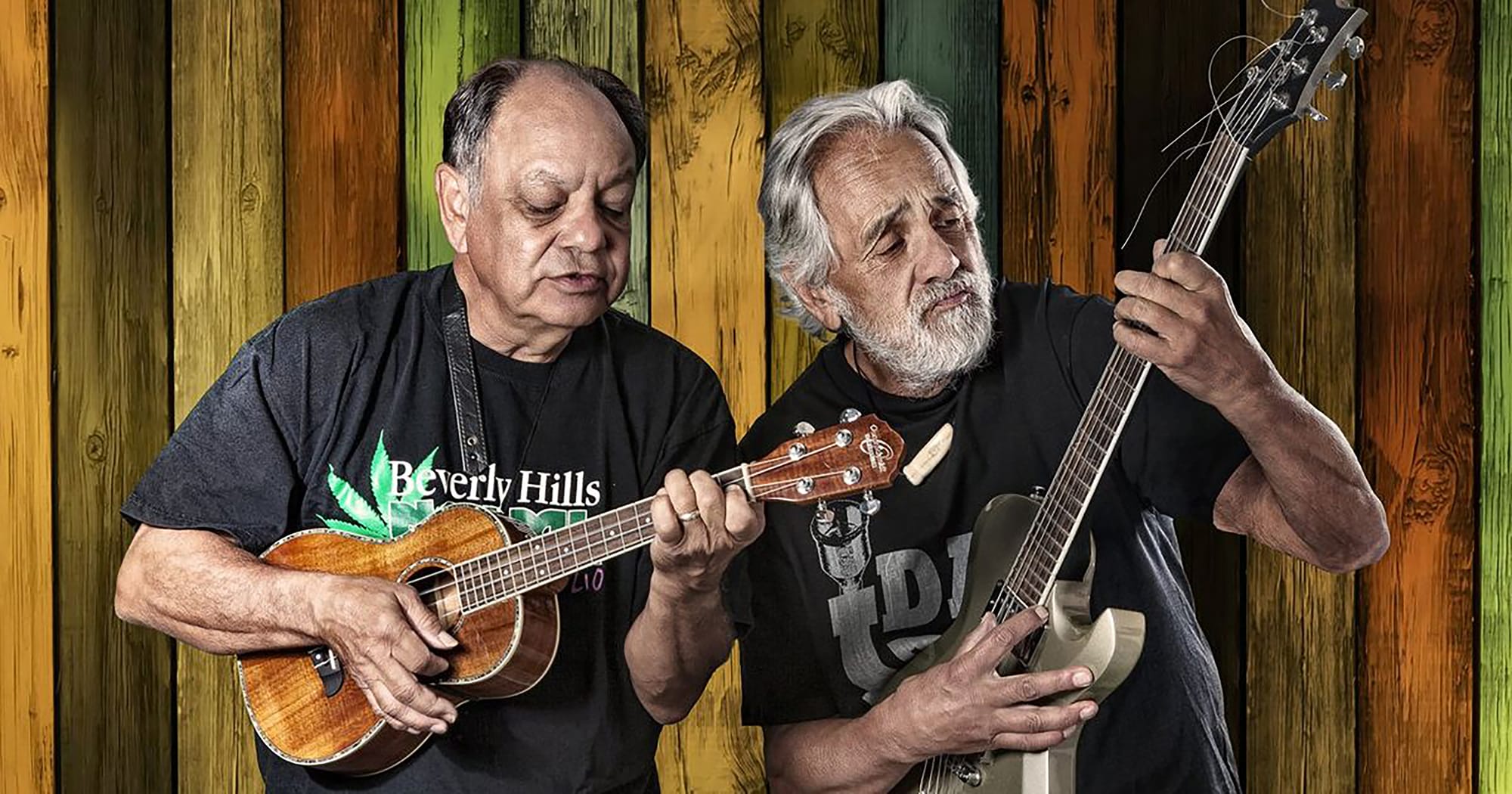
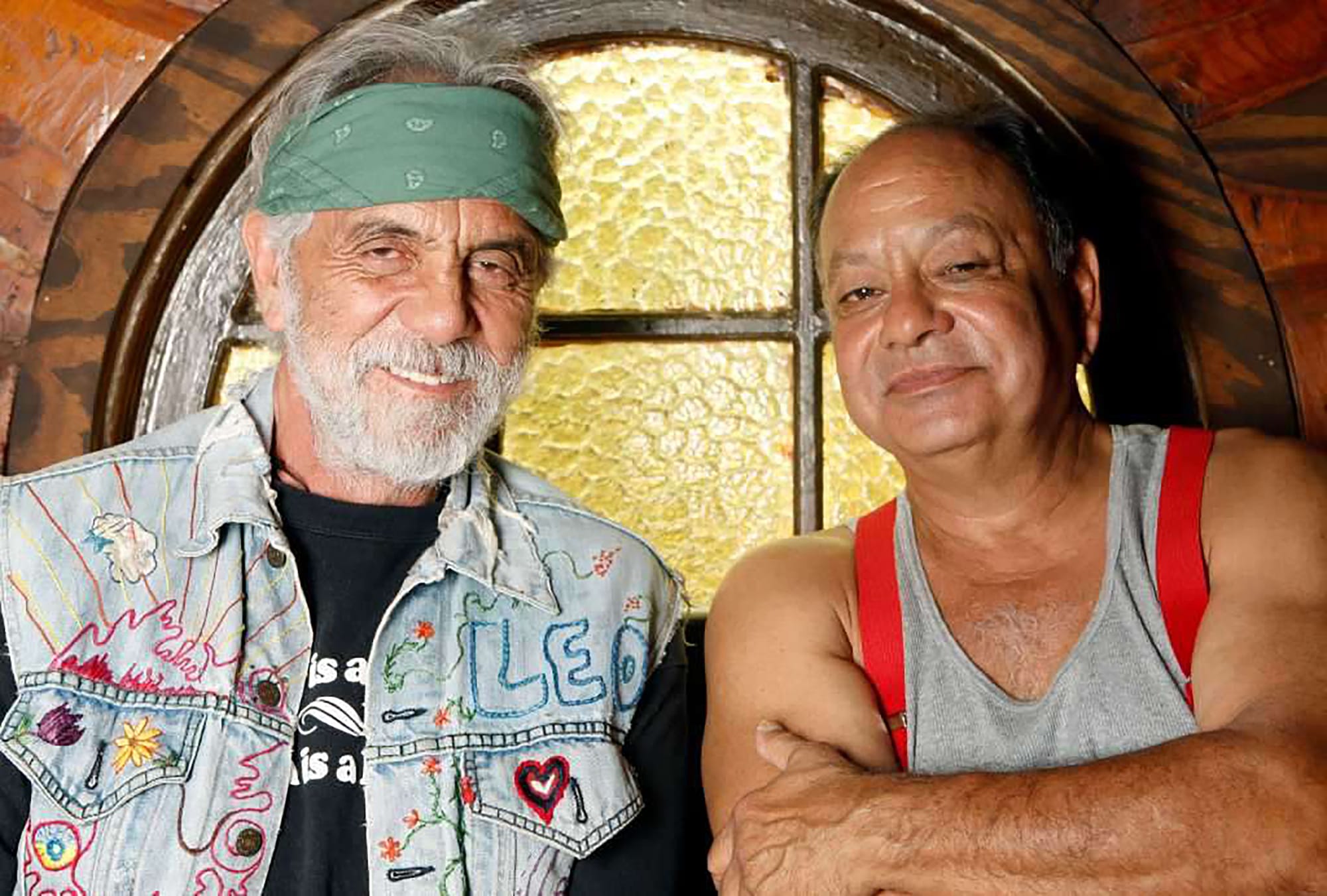
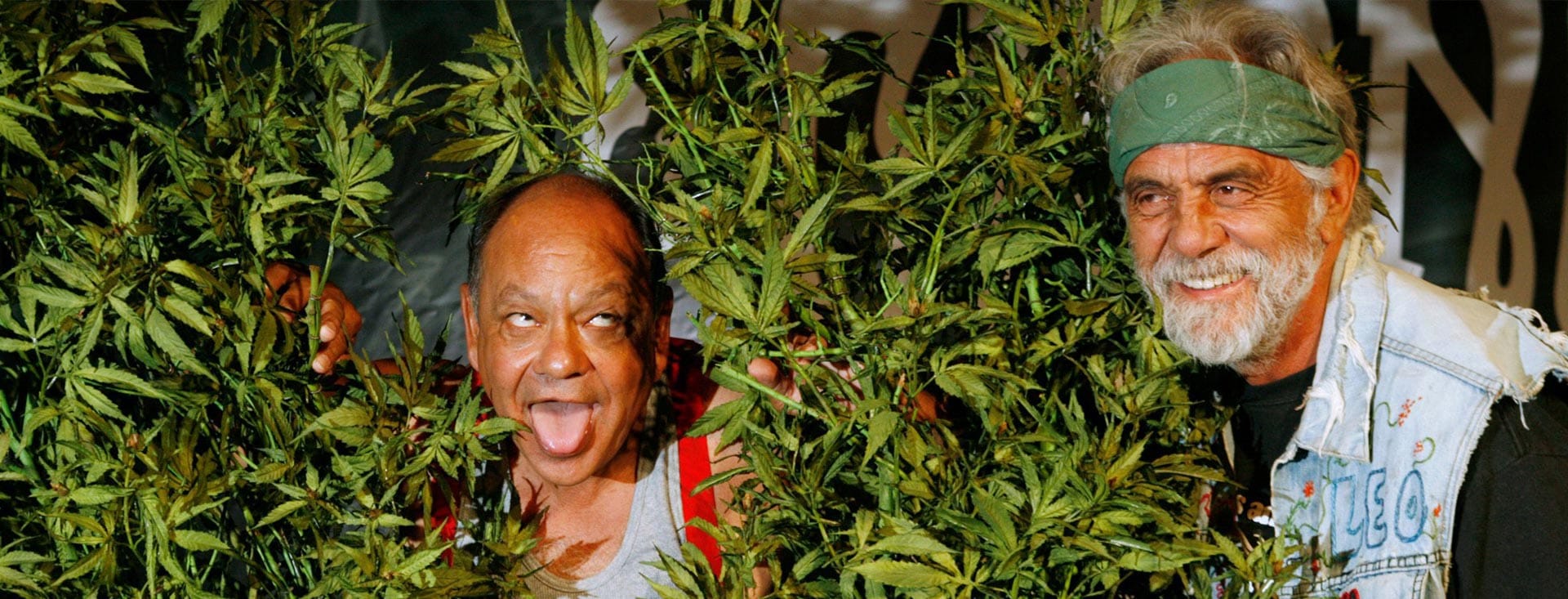
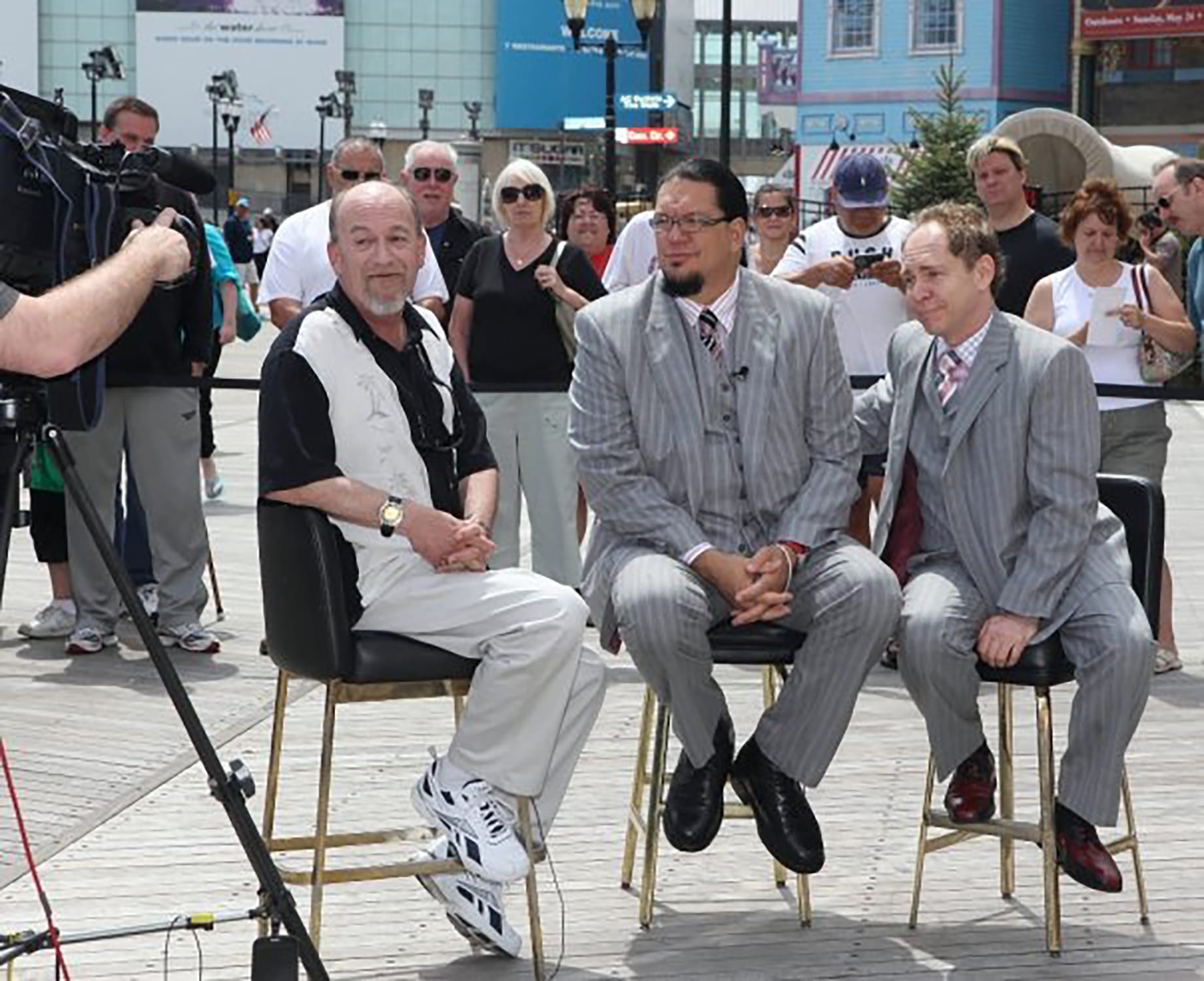
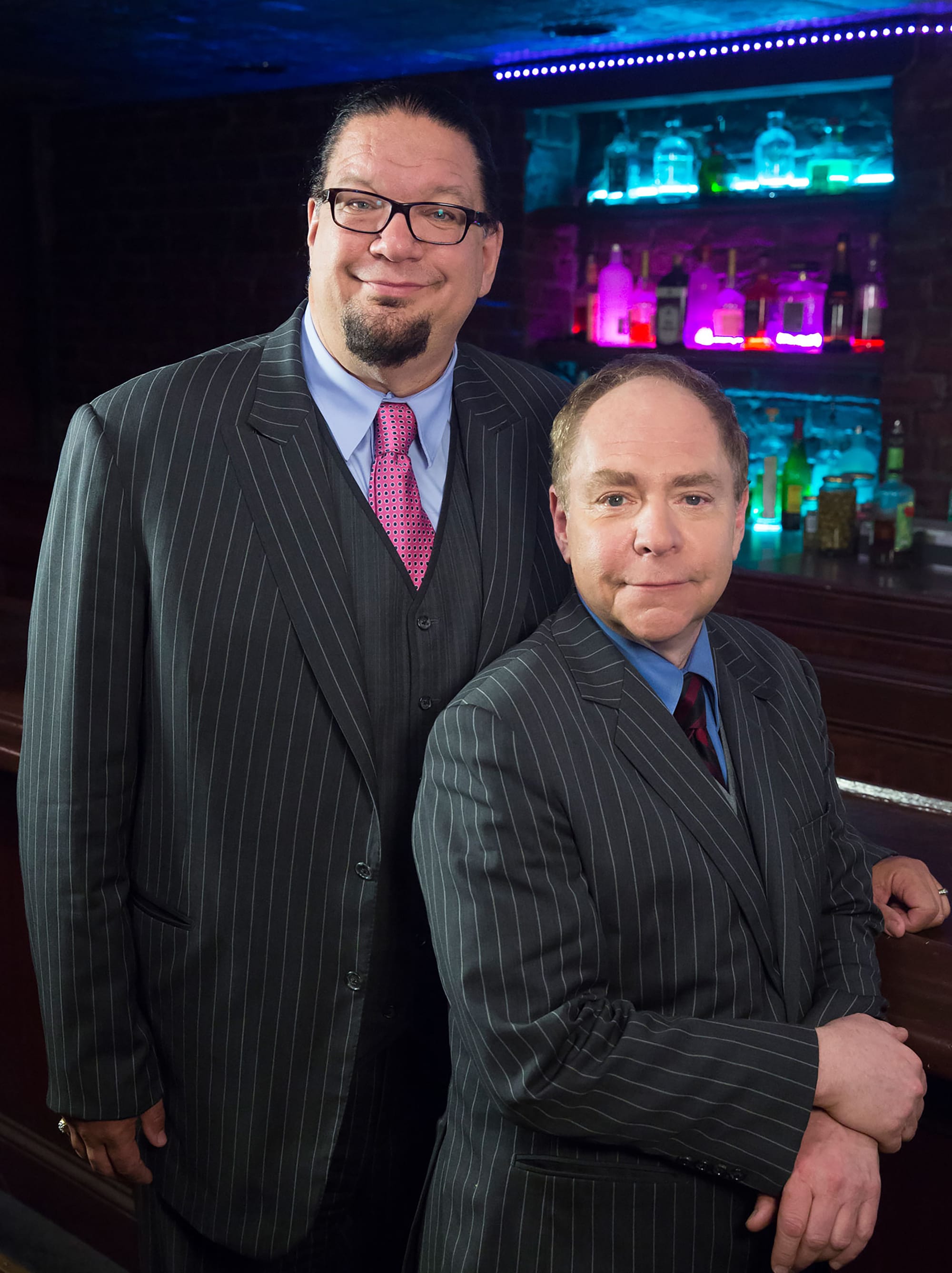
First 3 photos of Cheech and Chong. David Spatz with Penn and Teller, Penn and Teller.
Even though he recently shed 100 pounds, Jillette remains the towering, 6-foot-6-inch force whose looming presence can’t help but command an audience’s attention. At 5-feet-9, Teller has an almost impish quality about him that can garner just as many laughs as Jillette simply by his expressions.
And then there’s the magic. Students of the art of legerdemain say magic is like comedy. Just as there are seven basic jokes, and everything else is a variation on them, there are only a handful of actual tricks or illusions. The real art is to package a magic trick so it bares no resemblance to the basic one to which its origins can be traced. That’s where Penn & Teller succeed better than any other magicians, including great contemporary performers like David Copperfield and Criss Angel, both of whom have residency Las Vegas gigs and compete with Penn & Teller for ticket sales.
Having spent the past four decades working as a team, Penn & Teller have literally amassed a warehouse filled with original tricks. At this stage in their careers – Penn is 61, Teller 68 – you’d think they could rotate tricks in and out of their show and never have to concern themselves with developing new material.
Since Jillette says he has no evidence that they’ll ever be offered another job if this one ends, they’re constantly thinking of new ways to fool an audience. Some tricks can be developed in a few months. Others take a bit longer.
“One bit we worked on for six years, one three-minute hunk of the show,” Jillette explains during a phone call from his Las Vegas home just a few days before flying to Atlantic City for a one-night stand at Caesars. “Some bits we work on for a few months … and then we put it them in the show. There’s always a lot of puzzle-piece moving we have to do. We want to make sure the new bits get ‘hammocked,’ they’re put between two really strong bits so if they’re not that good, people don’t notice as much.”
Even the simplest trick can get complicated in the planning, developing and execution stages.
“Teller and I start with an idea that we’re thinking about that seems important to us. We then tend to think about how the plot of that idea can be presented,” he says. “Then we start thinking about what the trick would look like. Then we think about how to do the trick. Then we think about the plotting again, (then) we think about the comedy needs. And then we put the whole thing together.”
Although magic’s basic concepts date back many centuries, Penn & Teller are very much 21st Century entertainers. One bit currently in development would bring audience members on stage and involves their computer passwords. There are a lot of steps in creating the actual trick. The comedy is added almost as an afterthought.
“How do we get the people on stage? How to we move through them? How do they write, is it a pencil or a pen? How do we light it? How do we make it big enough for (an audience of) 1,400 people?” Jillette says. “And what do we say? Are the people (wearing microphones)? Then, after all of that’s done and it’s all laid out, I’ll go back a write a few jokes.”
Despite their on-going gig in Las Vegas, Penn & Teller have enough time to slip in some side projects. For seven years, they hosted “Penn & Teller: Bullshit!” on the Showtime cable network in which they mostly debated and debunked all kinds of previously-accepted theories and philosophies. The documentary-style series was nominated for 11 Emmy Awards, but never won an actual statuette because – some have suggested – the Emmys air on a broadcast TV network on which the word “bullshit” would get bleeped if they actually won.
The pair also hosts the TV reality series “Penn & Teller: Fool Us,” in which talented magicians from around the world try to pull one over on the guys. During three seasons, 34 out of 153 magicians, illusionist and mentalists have managed to put one over on Penn & Teller. The winners get to perform as the duo’s opening act in Las Vegas.
One reason the pair has endured for 40 years and shows no signs of ending is because each is free to go off and do separate projects without the other. They’re close, but they’re not best friends.
If he’s not working on a movie project or a television show, Jillette may be indulging his passion for jazz by playing an upright bass somewhere. Teller is a student of the theater whose side projects are about as far removed from Penn & Teller as you could imagine. He loves to direct live theater and has guided legitimate stage production of Shakespeare’s “The Tempest” and “Macbeth,” but in each show he managed to slip in a little stage magic. The Bard would have been amused.
And now we arrive at what can best be described as Penn & Teller and the Trump factor. President-elect Donald Trump could probably make a case for taking the credit for introducing Penn & Teller to Atlantic City. It was at his now-closed Trump Plaza Hotel & Casino where Penn & Teller made their Atlantic City debut in the 750-seat showroom, and it’s also where the magical jokesters filmed their dark comedy movie “Penn & Teller Get Killed” the following year.
So on the surface, it would seem Trump did play some role in bringing the duo to town. But Jillette, a contestant on season five of Trump’s “Celebrity Apprentice” until he was fired during week 11, wouldn’t buy Trump’s claim if he tried to make it. He’s not exactly The Donald’s biggest fan.
“Back then, (Trump) was too busy filling (Atlantic City) up with junk bonds and ripping off local contractors,” says Jillette, never one to mince words, even about the man about to become the nation’s 45th president. “But I don’t think he himself had much to do with us, because he can’t do anything.”
The real credit, he says, belongs to former Trump Plaza entertainment director Joel Fischman, who first booked Penn & Teller. Fischman relocated to Las Vegas in the early 1990s and still works on projects with Penn & Teller.
“As I far as I can tell, Joel Fischman does nothing but good and Donald Trump does nothing but bad,” Jillette says candidly. “That’s just the way it goes.”
* * *
When they first began writing and performing comedy about smoking pot nearly 50 years ago, Cheech Marin and Tommy Chong never thought they were actually blazing new trails in the funny business. Today, they still don’t think their stoner humor is unique.
“Well, our attitude about it today is the same as it’s always been because we always thought it was legal,” Marin, 70, says with a big laugh during a phone chat prior to performing at the Golden Nugget Atlantic City.
“We were just reflecting what the … culture was doing at the same time,” he adds. “We didn’t become hippies, we were hippies. I mean, George Carlin went from a straight (comedy) guy to a hippie guy. Richard Pryor went from a straight comedian to an edgy comedian. But we started out as hippie comedians.”
Despite the pale smoky blue haze in which they functioned, they still came up with a theory about pot a long time ago. Maybe, just maybe, pot could do more than simply get people high. Maybe it actually did have healing and medicinal properties.
“We thought, ‘What if we’re right? What if marijuana really is good for you?’ And now 26 states have some form of medical marijuana and four states have recreational (pot).”
At least six more states legalized either recreational or medical marijuana during November’s general election, meaning that even though the federal government says it’s illegal and possession is a crime, more than 30 states have either approved medical or recreational use of weed.
Marin expects pot to be completely legal across the country within five years. “And the world won’t come to an end,” he says.
Cheech and Chong are together again – sort of – and occasionally go out on tour to recreate the stoner routines that made them famous beginning in the late 1960s, when possession of even a single joint could get people thrown in jail for years.
The reason they’re “sort of” together is because they still argue over the creative differences that drove them apart for nearly 30 years beginning in the mid-1980s. Even today, backstage before a show, they might get into a tiff about something.
But it doesn’t happen with the frequency it used to, Chong says during a separate phone call because they really don’t like each other that much that they’re willing to do an interview together.
“We don’t really fight that much backstage anymore because we’re both kind of deaf, and we’re kind of slow, and we can’t even remember if we went to the bathroom, that’s how old we are,” Chong says with a big laugh. “So I have to bring a bucket sometimes.”
Actually, it was their kids who engineered the reconciliation after Cheech and Chong had essentially been divorced for decades. First, two of Chong’s daughters, Rae Dawn and Robbi, convinced them to do a movie, which would have been their first in about 25 years. But that deal fell apart when the movie studio folded.
Chong’s son Paris, now 42, had better luck convincing his dad and his former partner to make up just long enough to go on stage and do a show. That initially caused some confusion among newer fans, who came to know Cheech & Chong through their movies like “Up In Smoke,” “Nice Dreams,” “Still Smokin’” and “The Corsican Brothers,” to name a few.
“The vast majority – the Millennials – didn’t even know we did a theater act,” Marin says with a small laugh. “When we announced that we were going to go out on tour, they asked, ‘Well what are you gonna do on a stage? Are you gonna do like a (live) movie or something?’ They didn’t know (the live shows) was the biggest part of our identity before we started making albums and movies.”
So, when they go out on stage these days, they’ll do the comedy bits that are probably older than the parents of the kids in the audience. They’ll also do some fresher material written for them by Paris Chong, who’s now his dad’s manager. And, since they both started out as musicians, there’ll be songs like “Born in East L.A.,” “Santa Claus and his Old Lady” and “Earache my Eye.”
At 78 and now a first-time great-grandfather, Chong has been smoking pot recreationally since the late 1950s. But several years ago, he was able to tap its medicinal qualities when he was diagnosed with colorectal cancer.
“If it wasn’t for marijuana, I wouldn’t be here today,” Chong says in his one serious moment of the conversation. “Pot calms the brain down. It puts the brain to sleep in some cases. And that allows the body to heal itself. The body’s immune system kicks in, and that’s what happened with me. I just had a checkup and I’m totally cancer free.”
Some cancer specialists and researchers may take issue with Chong’s findings. But that’s his story, he says, and he’s sticking to it.

